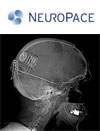
FDA regulators today announced that they granted premarket approval for NeuroPace for its anti-epilepsy device, an implantable neurostimulator that helps prevent seizures.
The RNS device monitors electrical activity in the brain, delivering stimulative therapy when activity appears abnormal. The approval is a 1st for the U.S. market and a major win for patients living with epilepsy, a disorder that affects nearly 3 million people in the U.S. alone.
NeuroPace’s RNS device is comprised of a neurostimulator implanted in the skull beneath the scalp, connected to a pair of electrodes that lead into parts of the brain where seizures believed to be the source of seizures. The implant delivers short bursts of electrical energy to disrupt abnormal brain activity before it gets out of control.
The RNS implant could be a game-changer for epilepsy, the 3rd most common neurological disorder after Alzheimer’s disease and stroke, the FDA said. Nearly 40% of epileptics are "severely affected" by seizures despite taking medication.
NeuroPace’s win was supported by findings from a 3-month, randomized, controlled trial of 191 patients with drug-resistant epilepsy. Patients with active neurostimulation therapy had about 34% fewer seizures per month, compared with a 19% reduction in their control-arm counterparts, according to an FDA notice.
The technology has been in the works for years, finally landing a date with the FDA in February, more than 2 years after NeuroPace filed its application. The FDA originally rejected NeuroPace’s July 2010 application on the grounds that the device maker hadn’t provided long-term follow-up data on its clinical trial patients, as requested. NeuroPace and the federal watchdog agency went a few more round until the company won FDA advisory panel review in February 2013. The FDA panel almost unanimously recommended approval for the RNS implant, voting that it was safe and effective and that its benefits outweigh its risks for epileptic patients.
Last month Cleveland Clinic selected the device as #3 in its top 10 medical innovations for 2014.
The RNS implant will have some competition on the market from alternative epilepsy treatments that may have more alluring safety profiles. Existing options include drug therapy and Vagus Nerve Stimulation, another neurostimulation implant that provides therapy via the vagus nerve in the neck.

